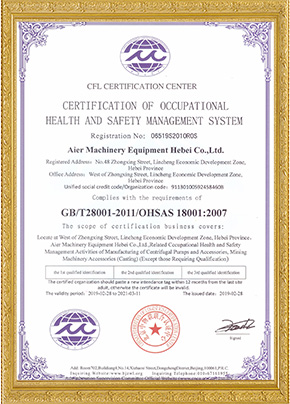Dec . 12, 2024 00:07 Back to list
chemical slurry pump
Understanding Chemical Slurry Pumps Essential Components for Industrial Applications
Chemical slurry pumps play a central role in various industrial applications, particularly in sectors dealing with abrasive, viscous, and corrosive materials. These pumps are engineered to handle slurries—mixtures of liquid and solid particles—making them vital in industries such as mining, chemical processing, wastewater management, and food production. This article delves into the types, applications, and key considerations for selecting and operating chemical slurry pumps.
What Are Chemical Slurry Pumps?
Chemical slurry pumps are specialized centrifugal or positive displacement pumps designed to transport slurries containing particulates of varying sizes. The construction of these pumps is critical, as they must withstand the wear and tear from the abrasive solids while also resisting the corrosive effects of various chemicals often present in the slurry.
Types of Chemical Slurry Pumps
1. Centrifugal Slurry Pumps These are the most common type, utilizing centrifugal force to move the slurry. The design generally features a volute casing and an impeller that can be optimized for different flow rates and pressures. Centrifugal slurry pumps are ideal for applications where a continuous flow is required.
2. Positive Displacement Pumps These pumps work by trapping a fixed amount of slurry and forcing it through the discharge. They are often used when handling highly viscous materials or slurries with a high percentage of solids. Types of positive displacement pumps include diaphragm pumps and gear pumps.
3. Horizontal and Vertical Slurry Pumps The configuration of slurry pumps can also be horizontal or vertical. Horizontal pumps are prevalent and easier to maintain, while vertical pumps are used in applications where space is limited or when suction from a deep sump is necessary.
Applications of Chemical Slurry Pumps
Chemical slurry pumps are used in a range of industries, including
- Mining and Mineral Processing In this sector, slurry pumps transport materials such as ore, minerals, and tailings, which are often abrasive and corrosive
.- Chemical Processing Pumps are used to handle various chemical slurries in the production of fertilizers, plastics, and other chemical products.
chemical slurry pump

- Wastewater Treatment Slurry pumps are crucial in transporting waste slurries and sludge during treatment processes in municipal and industrial facilities.
- Food and Beverage Industry They are used for pumping materials such as sugar slurry, fruit pulps, and other viscous food products.
Key Considerations for Selection
When choosing a chemical slurry pump, several factors should be considered to ensure optimal performance
1. Material Compatibility The pump materials must be compatible with the chemicals in the slurry. Materials such as rubber, polyurethane, stainless steel, and various alloys are commonly used to enhance durability and resist corrosion.
2. Solid Size and Type Knowing the size, shape, and density of the solids in the slurry will determine the pump's specifications, including the impeller design and the clearance between moving parts.
3. Flow Rate and Pressure Understanding the required flow rate and pressure will influence the choice between centrifugal and positive displacement pumps. Consult pump curves to find the right fit.
4. Viscosity The viscosity of the slurry significantly affects how easily it can move through the pump. Higher viscosity slurries may require specialized pump designs to facilitate transportation.
5. Maintenance and Serviceability Some pumps are easier to maintain than others. Selecting a pump with accessible parts and a straightforward maintenance schedule can prevent excessive downtime and prolong pump life.
Conclusion
Chemical slurry pumps are indispensable in managing industrial processes involving solid-liquid mixtures. Their ability to handle abrasive, viscous, and corrosive materials makes them unique in their functionality. By understanding the different types of slurry pumps and considering key factors for selection, industries can ensure efficient and reliable operations. Ongoing advancements in pump technology continue to enhance performance, energy efficiency, and serviceability, further solidifying the role of chemical slurry pumps in modern industrial applications. Investing in the right slurry pump not only optimizes processes but also contributes to overall operational success and sustainability.
-
China Portable Slurry Pump Manufacturer - Durable & Efficient Submersible Design
NewsMay.29,2025
-
High-Quality Submersible Slurry Pumps Reliable Manufacturer & Supplier
NewsMay.29,2025
-
High-Quality Sand Dredge Pump 8 Durable Manufacturer & Supplier
NewsMay.29,2025
-
Electric Submersible Slurry Pump - Durable & Efficient China Suppliers
NewsMay.29,2025
-
Submersible Slurry Pump with Agitator Durable China Suppliers & Manufacturers
NewsMay.29,2025
-
Vertical Sump Pump Rubber Lined - Durable Corrosion-Resistant Design China Manufacturers
NewsMay.29,2025
